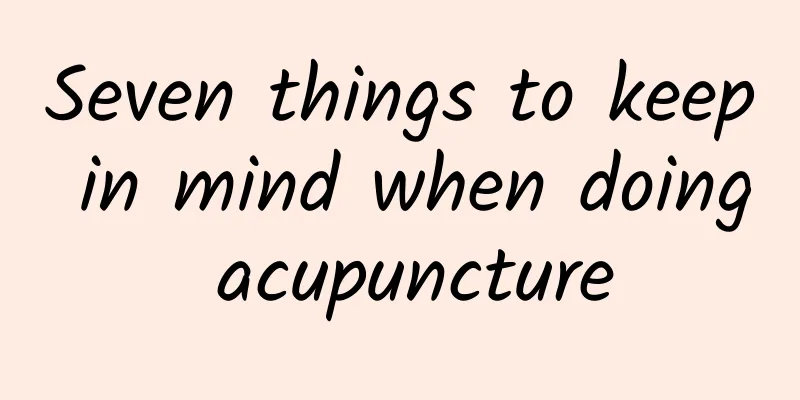Seven things to keep in mind when doing acupuncture

|
Acupuncture is a magical part of traditional Chinese medicine. It uses specific needles or moxibustion to stimulate certain acupuncture points (acupoints) on the human body, and through the meridians, it strengthens the body's body and eliminates evil, stimulates the body's resistance to disease, and thus achieves the purpose of curing diseases. It is a natural therapy that has a good therapeutic effect on most diseases. Although acupuncture is good, it is not suitable for everyone at any time. The following acupuncture precautions should be kept in mind: 1. People who are too hungry or tired Acupuncture should be performed after resting and eating, otherwise it is easy to cause needle sickness. Symptoms of needle sickness include sudden mental fatigue, dizziness, palpitations, shortness of breath, nausea, pale complexion, cold sweats, etc. If the above situation occurs, you should inform your doctor immediately for treatment. Patients who suffer from needle phobia can usually recover to normal after lying down and resting. 2. The pain caused by acupuncture is mainly caused when the needle enters the skin Acupuncturists can reduce most pain sensations to a mild level that is completely tolerable. Patients who are receiving acupuncture for the first time should not be nervous and try to relax as much as possible to facilitate the acupuncture. After the needle enters the skin, the patient will generally feel a sensation of sourness, numbness, swelling, heaviness, or heat, coolness, itching, twitching, or ant-like sensations under the needle. Some acupoints may sometimes have varying degrees of electric shock or other needle sensation conduction and diffusion phenomena. This is a normal acupuncture reaction, which Chinese medicine calls "De Qi." 3. Patients should take a comfortable and natural position during acupuncture Otherwise, you will easily get tired during the period of needle retention; the limbs should not be moved during the period of needle retention to avoid adverse consequences such as needle breakage, needle displacement and accidental injury to tissues. Some patients experience some discomfort at the local acupoint after acupuncture, which usually disappears within a few hours. 4. If you feel pain after the needle enters the skin The needle tip may have touched a blood vessel. Please tell your doctor so that the direction of the needle can be adjusted to avoid the blood vessel. It is inevitable that acupuncture may sometimes touch small blood vessels and cause bleeding. Except for affecting the aesthetic appearance of some parts, it does no harm to the human body. If a small blood clot appears at the needle hole, press it firmly for more than 3 minutes. Small local bruises generally do not require treatment and will gradually disappear on their own. 5. When acupuncture needles are left in place, you should close your eyes and rest. Reading books, newspapers, chatting on the phone, etc. will reduce the effectiveness of acupuncture. 6. The skin at the needle hole should be kept clean Generally, do not get in contact with water for 2 hours after the injection to prevent infection. When using fire needles, pricking, bloodletting or auricular acupuncture for treatment, the needle holes should not be exposed to water on the day of treatment. The skin of diabetic patients is prone to infection, so they should keep the local skin clean. 7. When using a heating lamp or moxibustion The local area of the acupoint should maintain a comfortable warm feeling. If it feels too hot, inform the doctor in time to avoid burns. If the patient has reduced skin sensation, he or she should also inform the doctor to avoid unknowingly getting burned. When cupping, it is generally not more than 10 minutes, otherwise blisters are likely to form. Please cooperate with the doctor to remember the time. |
<<: Effects and functions of Chinese medicine Pinellia
>>: Six Viewpoints of TCM Health Preservation and Disease Prevention
Recommend
What are the effects and functions of Cyperus rotundus
Cyperus rotundus is a relatively common and widel...
The difference between menstruation and pregnancy
The symptoms of menstruation are completely diffe...
How to treat vulvar itching? Tips for treating vulvar itching in women
Vulvar itching mainly occurs in the female vagina...
What is phlegm-dampness constitution and how to take care of it?
People in this world are all different. Many peop...
Fetal femur length reference standard
We all know that pregnant women need to undergo m...
How can I make myself pee quickly?
If you have ever had an ultrasound, you may have ...
Normal anus and hemorrhoids
When people develop hemorrhoids, they must receiv...
What causes coughing?
Coughing should be familiar to most of us, becaus...
What to do if you lose your hair? Choosing the right treatment is key
In our lives, many people suffer from hair loss t...
The role and efficacy of glycerin
Everything in the world has its value. You may no...
How to regulate qi and blood deficiency and uterine coldness
Women with cold uterus have poor physical constit...
What is the Atherosclerosis Index?
Atherosclerosis is a common disease problem among...
The efficacy and function of orange peel
Orange peel is simply the food that is made by wa...
Can Purslane Cure Flat Warts?
Purslane is also called melon seed vegetable. It ...
Effects of Shiwei
Shiwei is a plant that grows in the cracks of roc...









